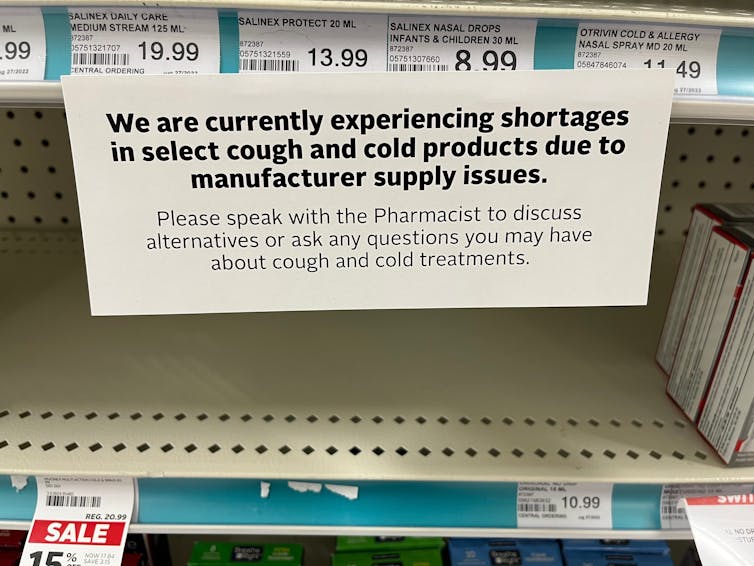This winter has been one of the worst on record for the NHS. Ambulance and A&E waiting times are at all-time highs, and many are struggling to access emergency treatment.
Patients are now reporting difficulties accessing certain over-the-counter medicines used to treat colds and flu from pharmacies and high-street outlets. While medicine shortages have been a common phenomenon in previous years, they have often been the result of supply chain issues due to global events, such as the pandemic or the Russian invasion of Ukraine. But these aren’t the same reasons people are reporting when experiencing shortages of non-prescription, over-the-counter products.
‘Tripledemic’
Several countries, including the UK, the US and Canada, are reportedly in the midst of a “tripledemic” this winter — meaning they’re experiencing higher than expected cases of COVID, flu and RSV concurrently.
In England alone, it’s estimated that one in 25 people are currently infected with COVID. Flu cases are also on the rise, with hospital admissions at their highest level since the winter of 2017-18. Alongside this, there have also been outbreaks of strep A and seasonal illnesses.
Since these viral infections cause symptoms such as fever, coughs and sore throats, many people turn to over-the-counter medicines to remedy them. Some may also be making anticipatory purchases in case of illness.
In Canada, pharmacists have reported bare shelves, with a lack of both children’s and adults’ cold and flu medication. Worries about shortages can then lead to stockpiling and panic buying. In the US, some pharmacies have opted to restrict sales due to increased demand by putting a cap on the number of certain medications people can purchase at a time.
In the UK, popular pain and fever products reportedly have low stock availability, and there are also shortages of cough mixtures and lozenges.
Not enough stock?
Manufacturers in the UK have said that stock does exist and they are working to respond to higher-than-usual demand. In Canada, pharmacies are receiving supplies, but stock sells out almost as soon as it hits the shelves. Many people are finding it difficult to get the medicines they need – with some places out of stock entirely.
Some think inadequate government planning may explain the lack of stock in the UK. But again, there’s no clear evidence for this.
An earlier start to seasonal flu has caused problems in Canada, with manufacturers not having time to build up essential stocks in summer and an uptick in seasonal illness creating higher product demand. In early January 2023, the Canadian government announced it was aware of supply constraints of products used to treat cold and flu symptoms. Likewise, the UK government confirmed it had been made aware of availabilty issues of some branded cold and flu medicines.

Supply chain issues may be one reason for shortages in certain countries. Jenari/ Shutterstock
There’s also a chance that stock isn’t being distributed evenly. Some pharmacies may carry more stock than others, and could help support areas with low stock availability. Pharmacies with multiple sites will know stock levels held in their stores and can move stock between locations. The UK government has said that availability issues with some branded cold and flu medicines are temporary and localised, and that it is working with suppliers to investigate these.
Another problem that may be feeding into supply issues is the forecasting used to inform stock production. If stock forecasting for winter 2022-23 was based on previous years’ usage figures, it may be skewed. During the pandemic, many preventative measures (such as wearing masks) protected us against common germs and viruses too, lowering levels of illness and reducing demand for cold and flu remedies. In light of this, manufacturing quantities may have been adjusted to avoid stock wastage, not knowing that an earlier surge of seasonal illness would happen this year.
What you can do
If you have cold or flu symptoms, you should seek advice about treatment from your pharmacist and, as needed, your doctor or healthcare provider.
If you’re finding it difficult to get your usual over-the-counter products for cold and flu, you may want to try alternatives – including generic (non-branded) products. For instance, if you’re having trouble finding products such as Lemsip to manage cold and flu symptoms, paracetamol and vitamin C are great alternatives as these are often the main ingredients in cold and flu products. The same is true of throat lozenges, with many alternatives on offer.
If one formulation of a product isn’t available, your pharmacist may be able to recommend an alternative form – such as substituting children’s Calpol syrup with Calpol tablets which dissolve in the mouth (where age appropriate).
COVID and flu vaccines are still recommended to prevent serious viruses, so people are encouraged to get these as soon as they can. While the optimal time to book your flu jab is in the autumn or early winter, before flu starts spreading, it will still offer protection if you get it now.
The UK Health Security Agency is warning that winter illnesses including flu, COVID, RSV and strep A are circulating at high levels with no immediate sign of abatement. If you’re one of the millions of people currently suffering from one of these illnesses, speak to your pharmacist to know what treatment options are available to you.
Medicine shortages have occurred in the UK for many years – and will continue to do so. But the current shortage of cold and flu products shows an escalation of issues with the UK’s medicine supply chains, making it clear that weakness in the system needs to be urgently addressed.



 FDA Targets Hims & Hers Over $49 Weight-Loss Pill, Raising Legal and Safety Concerns
FDA Targets Hims & Hers Over $49 Weight-Loss Pill, Raising Legal and Safety Concerns  Sanofi’s Efdoralprin Alfa Gains EMA Orphan Status for Rare Lung Disease
Sanofi’s Efdoralprin Alfa Gains EMA Orphan Status for Rare Lung Disease  Novo Nordisk Launches Once-Daily Wegovy Pill in U.S. at Competitive Pricing
Novo Nordisk Launches Once-Daily Wegovy Pill in U.S. at Competitive Pricing  Viking Therapeutics Sees Growing Strategic Interest in $150 Billion Weight-Loss Drug Market
Viking Therapeutics Sees Growing Strategic Interest in $150 Billion Weight-Loss Drug Market  Weight-Loss Drug Ads Take Over the Super Bowl as Pharma Embraces Direct-to-Consumer Marketing
Weight-Loss Drug Ads Take Over the Super Bowl as Pharma Embraces Direct-to-Consumer Marketing  Royalty Pharma Stock Rises After Acquiring Full Evrysdi Royalty Rights from PTC Therapeutics
Royalty Pharma Stock Rises After Acquiring Full Evrysdi Royalty Rights from PTC Therapeutics  U.S. Vaccine Policy Shifts Under RFK Jr. Create Uncertainty for Pharma and Investors
U.S. Vaccine Policy Shifts Under RFK Jr. Create Uncertainty for Pharma and Investors  Innovent Biologics Shares Rally on New Eli Lilly Oncology and Immunology Deal
Innovent Biologics Shares Rally on New Eli Lilly Oncology and Immunology Deal  Merck Raises Growth Outlook, Targets $70 Billion Revenue From New Drugs by Mid-2030s
Merck Raises Growth Outlook, Targets $70 Billion Revenue From New Drugs by Mid-2030s  Federal Appeals Court Blocks Trump-Era Hospital Drug Rebate Plan
Federal Appeals Court Blocks Trump-Era Hospital Drug Rebate Plan 

































